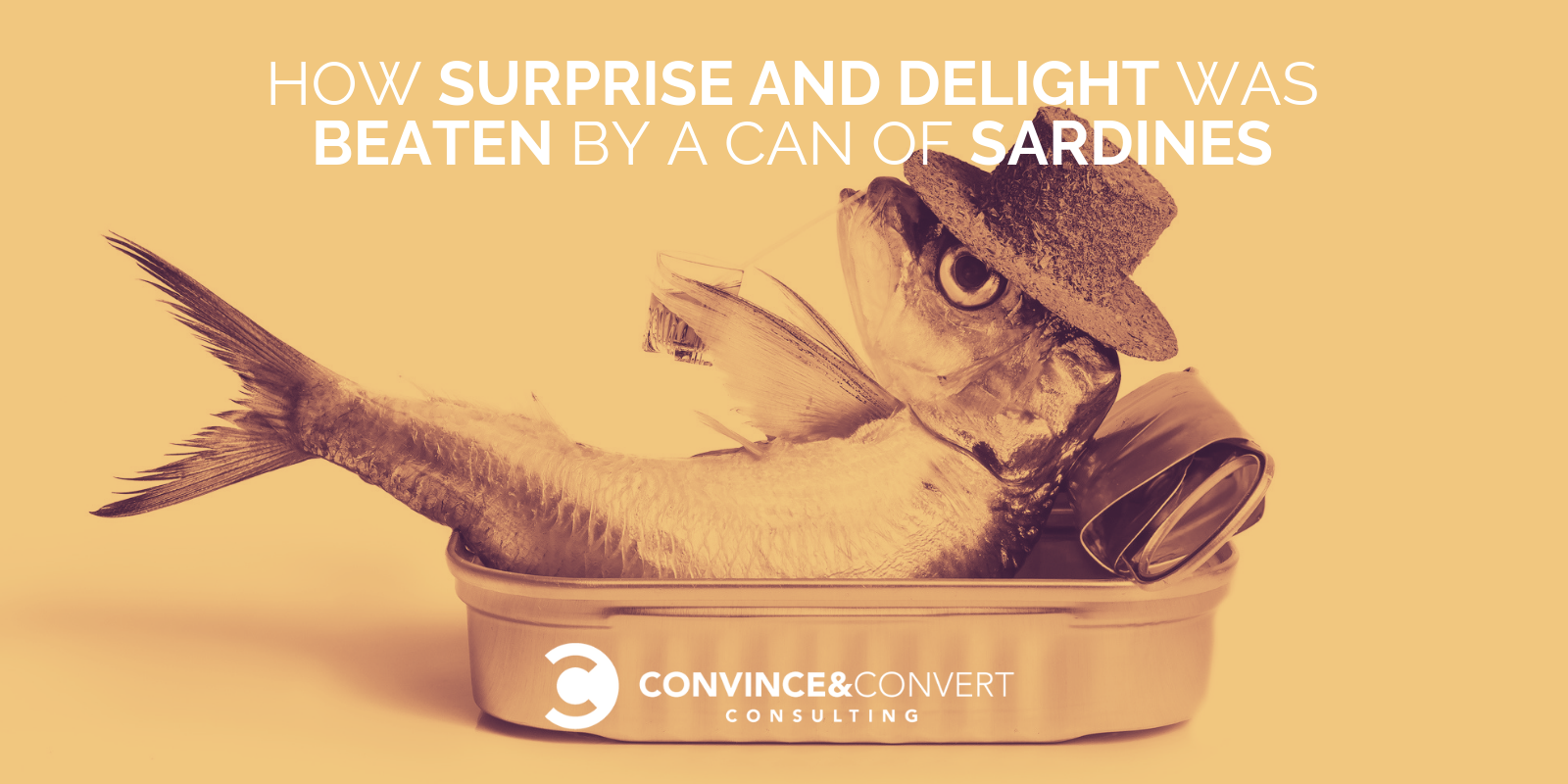
You’d have to be a killjoy to not smile at the tale of Ritz-Carlton hotel workers reuniting a young boy with Joshie, his beloved stuffed giraffe.
The story serves as a stellar example of surprise and delight. When the Ritz-Carlton staffers saw that the young guest had left his favorite toy behind, they decided to take the opportunity to go the extra mile. They took pictures of Joshie enjoying a grand adventure at the hotel, including a spa visit, before returning the toy to its elated owner.
Brands that want to make a splash on social media are increasingly attempting to use surprise and delight as a marketing tactic. These acts of kindness bring plenty of joy to the lucky beneficiaries, and the incidents spark social network buzz for a hot minute. And while everyone might enjoy the tale of a stuffed giraffe finding its way home, this tactic is more of a marketing stunt than a marketing plan. Instead of gambling with your brand, focus your effort on building true talk triggers — stories that people cannot help but share with their networks.
Talk triggers are operational differentiators that all customers are able to experience every single time they interact with your brand. It might be almost imperceptible, and it probably won’t go viral, but it will spark a story about your brand that people keep sharing.
#TalkTriggers are operational differentiators that all customers are able to experience every single time they interact with your brand.
Click To Tweet
The Underrated Power of Repetition
The clue to surprise and delight’s downfall is right there in its name. In order to surprise a customer, a special event or gift must be a once-in-a-lifetime occurrence. If the Ritz-Carlton reunited stuffed animals with their owners every single day, we probably wouldn’t care.
On top of that, the story of Joshie, while meaningful to his owner, does not appear to have made a tremendous impact on the brand value of Ritz-Carlton. The toy giraffe’s adventure drew plenty of attention while it was unfolding, but the story ended as soon as Joshie returned home. As a result, any lasting effect on the Ritz-Carlton brand is minimal.
The difference between a delightful surprise and a talk trigger is repetition. Talk triggers are designed to consistently and reliably impress consumers. They don’t rely on a lottery approach that singles out one lucky person; instead, they are meant to be experienced by every single customer. A talk trigger truly catalyzes long-term conversations, allowing brands to hone the effectiveness of their messaging over time.
The difference between a delightful surprise and a talk trigger is repetition. A talk trigger truly catalyzes long-term conversations, allowing brands to hone the effectiveness of their messaging over time.
Click To Tweet
The freshly baked cookies that greet every guest at a DoubleTree by Hilton hotel are a perfect example of the power of repetition. Based on research for my new book, we found that 34 percent of guests mention DoubleTree’s cookies when talking about a stay in one of the chain’s hotels — that’s about 25,500 people every day chatting about cookies. None of this would happen if DoubleTree only gave out cookies on Wednesdays or abandoned its baked goods for a huge contest with an incredible prize. Word of mouth works because customers do the marketing for you, and the best way to make that happen is for all customers to have the chance to experience the same thing.

One brand that has embraced repetition to stand out from the crowd is Lisbon’s Clube de Jornalistas. This renowned press club is popular with the city’s professionals, building its brand based on the excellence of its food and hospitality.
But even ongoing excellence needs a talk trigger to enter the public conversation. That’s why Clube de Jornalistas has engaged customers in an ongoing story since its inception. Chef Ivan Fernandes started this talk trigger when he decided to give each of his patrons a small gift after a visit.
These gifts began as simple, useful objects such as reusable cotton shopping bags or luggage tags. Guests took these high-quality branded items as they traveled around town (and the region), proudly displaying the name of the club. What really catalyzed this talk trigger, though, was when Fernandes decided to give out sardines.
Yes, sardines. A beloved local snack, customers frequently requested the humble sardine at Clube de Jornalistas. Because the fish was so common, the chef had never worked it into the menu. The missing sardines became an inside joke at the club and, Fernandes realized, an ideal talk trigger.
Instead of adding the fish to his menu, he decided to give a can of sardines — elegantly wrapped in a local newspaper to mesh with the restaurant’s theme — to each and every guest. There is nothing fancy about the fish, but they are certainly unusual and undoubtedly spur people to share the story of the missing menu item. This talk trigger works because it’s unexpected — but it’s incredibly effective because all patrons get their own sardines.
Whether it’s a can of oily fish or a similarly small and meaningful gesture, brands can get far more mileage out of talk triggers than they can out of extravagant, once-in-a-lifetime gestures. As charming as the odyssey of Joshie the giraffe is, surprise-and-delight tactics are here today and gone tomorrow. The key to ongoing conversations is repetition. Keep your customers talking and sharing your brand story, and you’re certain to enjoy the benefits for decades to come.
This content was inspired by research and case studies contained in “Talk Triggers: The Complete Guide to Creating Customers With Word of Mouth,” the new book from Jay Baer and Daniel Lemin.
The post How Surprise and Delight Was Beaten by a Can of Sardines appeared first on Convince and Convert: Social Media Consulting and Content Marketing Consulting.
https://ift.tt/2PLx2Cw
No comments:
Post a Comment